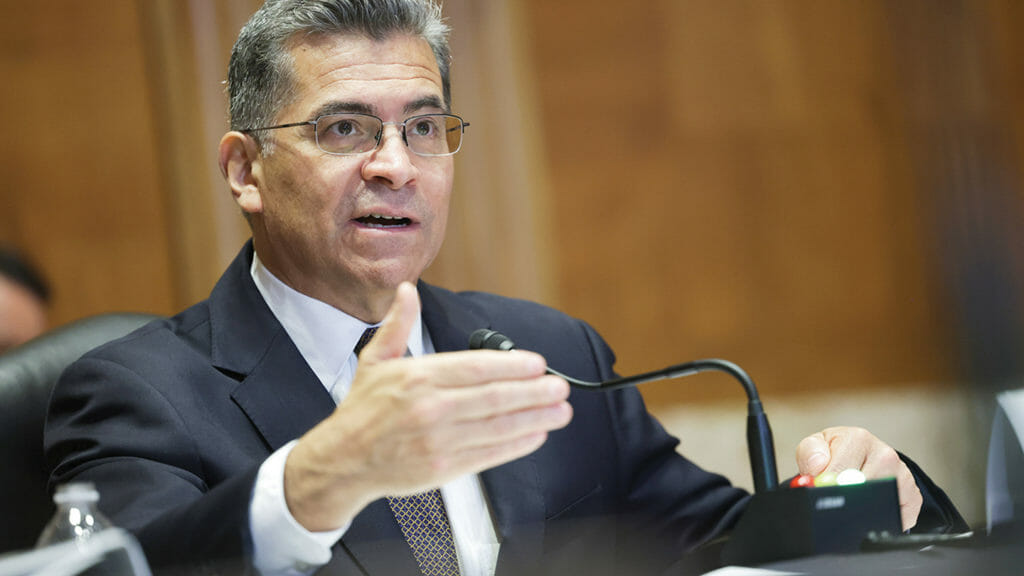
A Congresswoman and two major US nursing home associations hit back Wednesday, the day after Health and Human Services Secretary Xavier Becerra defended the administration’s plan to impose first-ever nursing home minimum staffing levels.
Rep. Michelle Fischbach (R-MN) raised the topic during a House Ways and Means Committee hearing Tuesday. Becerra did not directly answer her questions pertaining to the potential effects of a mandate on providers and operators.
“It seemed the Secretary either did not understand this issue or did not care,” Fischbach said in an email to McKnight’s Long-Term Care News. “I have sent a letter to the Centers for Medicare and Medicaid Services, which is under the purview of the Department of Health and Human Services, encouraging them to reconsider this (minimum staffing) proposal and instead focus on working with stakeholders to develop innovative solutions that boost the recruitment and retention of qualified nursing professionals.”
Parameters of the staffing mandate proposal are widely expected to come in the Centers for Medicare & Medicaid Services’ proposed skilled nursing payment rule, which could be released in the next few weeks.
“The proposed staffing ratio requirement in nursing homes is a one-size-fits-all strategy that may make sense for urban areas but will hurt and potentially close rural nursing homes,” Fischbach told McKnight’s. “If a rural home closes, its residents will still need to find somewhere to go, and many of them will not be accommodated under this requirement, potentially leaving them with no nursing home option at all.”
Access has been a concern for many stakeholders, who have seen skilled nursing operators shut down services, wings or even buildings during the pandemic. Often, the reason is a lack of staff to operate existing facilities adequately.
“We agree with Secretary Becerra that quality nursing home care is top priority,” said LeadingAge Senior Vice President for Policy Ruth Katz in a statement to McKnight’s Wednesday. “The bottom line is this: Quality of care and staffing work hand-in-hand; without staff, there is no care. Any action to create and implement staffing requirements must be realistic. Without that, a mandate is meaningless. “
Context needed, providers say
Katz urged Becerra and federal regulators to “acknowledge the context of nursing homes’ operating environment, which includes three critical issues: there are too few people to hire in nursing homes; the costs of delivering quality nursing home care far exceed reimbursement; and a single staffing level cannot fit the needs of every resident in every nursing home across the country.”
She added that responses to LeadingAge’s most recent informal, member ‘snap’ poll on workforce demonstrate the severity of staffing needs. As reported by McKnight’s earlier this month, nearly two-thirds of the 900 respondents said they had not seen improvement in staffing levels since last asked in June 2022.
“Without enough workers to deliver the services our nonprofit, mission-driven members provide, older adults and families simply cannot get the care they need,” Katz said in her email to McKnight’s. “That undeniable truth must inform every policy decision.”
The American Health Care Association/National Center for Assisted Living, also railed against Becerra’s comments Wednesday.
“We appreciate Rep. Fischbach raising this important issue and hope more Washington policymakers will recognize the real world implications of this impractical proposal,” read a statement from AHCA/NCAL emailed to McKnight’s. “Despite their tireless efforts, long term care providers are struggling to recruit new caregivers in this current labor market, and nursing home closures are extremely detrimental to our nation’s seniors and their access to care.
“Staffing requirements without resources or workforce development programs will not solve this labor crisis,” the AHCA/NCAL statement continued. “We will continue to advocate for meaningful support and investments to help strengthen the long term care workforce.”
Both associations have recently ramped up their protests against the looming release of any staffing mandate parameters. Each also has proposed its own set of recommendations and alternatives to any unilateral action to impose across-the-board staffing minimum standards.
Becerra balks
At Tuesday’s Ways and Means Committee hearing, Fischbach broached the subject by asking Becerra whether the staffing minimum stipulations would lead to building closures or fewer patients being served. He did not answer directly, according to an Inside Health Policy account.
“I would say the most important thing about any nursing home facility is that they offer quality care, and if you can’t offer quality care, maybe you shouldn’t have your doors open,” Becerra answered. “And that’s why we want to make sure that if you’re open, first and foremost, you care about the people that you’re serving, which means you have to have the level of services required to care for people.”
After Fischbach again raised the specter of staffing ratios making it more difficult for providers to operate, Becerra responded by saying staffing minimums are important for nurses.
The Biden administration first announced its plans for nursing home reforms, including a first-ever staffing minimum on Feb. 28, 2022. That was the day before President Biden historically took “Wall Street” nursing home owners to task in a brief passage in his first State of the Union Speech. He subsequently leaned on nursing home operators again in his second State of the Union speech earlier this year.
The letter Fischach referred to sending to the White House earlier this month is one of a small handful that various groups of lawmakers have circulated in recent months. Some have called for reconsideration of the staffing mandate pledge, while clothes have urged a quick release of the proposal, which should include resources to make sure operators can supply any newly mandated level of workers.




